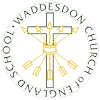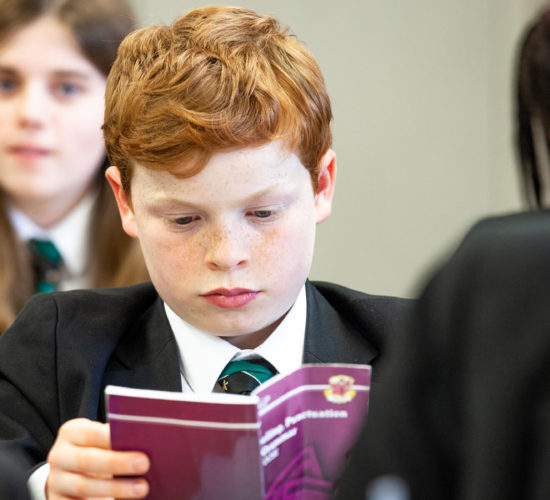
Our daily routines and educational practice are rooted in the twin values of Dignity and Respect.

We want Waddesdon students to be curious in exploring other ways of living and viewing the world. Through our curriculum we encourage students to cultivate a lifelong love of – and curiosity about – literature.
We want Waddesdon students to be critical in their exploration of literature and in their approach to the world around them. Our aim is for students to construct increasingly well-structured arguments, exploring complex ideas in a nuanced manner – fluently, critically and with sophistication.
We want Waddesdon students to be creative in their spoken language and in their writing: they build confidence in speaking publicly, formally and persuasively, including ‘in role’. We seek to nurture in them an appreciation of the power of language, harnessing and developing students’ creative skills through a range of written and spoken activities.
Miss Sarah CaswellSubject Leader for English |
Ms Vanessa ClarkSecond in English |
Ms Imogen OgdenSecond in English |
Mr Joseph BrayEnglish Teacher |
Mrs Lauren HaggertyEnglish Teacher |
Ms Emma LiveseyEnglish Teacher |
Curious
We want Waddesdon students to be curious in exploring other ways of living and viewing the world. Our aim is to meet the needs and aspirations of our students so that they have a lifelong curiosity about life, ideas and literature. E.M. Forster’s injunction “only connect” encapsulates our aim for students to connect ideas so as to become more curious about the world and the language used to interpret and reflect its diversity. We believe that reading is a way in which students can understand how lives are – and have been – lived in different places and in different times. Further, we want students to be curious about different ways of using language, both analytically and imaginatively.
To this end we read a range of diverse texts at KS3 – for example, the class readers Bone Talk and Noughts and Crosses – and explore how language allows an individual to play a part in a modern democratic society. At KS4, students are exposed to the constraints felt by individuals within society, to the genres of dramatic tragedy and crime fiction, as well as to a wide range of non-fiction texts and poems. We continue to nurture in students the curiosity to connect their work in lessons with their experience of the wider world. At KS5 students further explore Shakespearean tragedy, are invited to be curious about the tensions between an individual and the society in which they live – including the scientific developments of that society – and examine how contemporary poets find their own ways of managing and manipulating language to negotiate their experiences of the modern world. Through the curriculum we encourage students to cultivate a lifelong love of – and curiosity about – literature.
Critical
“I am nothing if not critical” says Iago. We want Waddesdon students to be critical in their exploration of literature and in their approach to the world around them. Students read a range of prose (fiction and non-fiction), poetry and drama from across the ages, developing their responses through the depth and sophistication of their analysis. As time goes on, students learn to develop increasingly rigorous lines of argument.
Students develop their critical responses from an engagement with A Christmas Carol in Year 7, through their study of GCSE texts such as Animal Farm and Romeo and Juliet, and into A Level work on, for example, Frankenstein and Othello. Students also build resilience and gain confidence in exploring and analysing unseen texts with increasing independence. We know that high achievement at KS4 enables students to build more successful futures, academically and personally, and so we ensure that they are equipped with the skills and knowledge to achieve exceptionally well in their English Language and English Literature exams. Students develop their critical appreciation and enjoyment of a range of writers, contexts and genres as they explore and compare poems, novels and plays in depth and, at KS5, through using a number of different critical lenses. They develop the skills of reading analytically and placing texts within different frameworks and contexts. Our aim is for students to construct increasingly well-structured arguments, exploring complex ideas in a nuanced manner, fluently and with sophistication. Ultimately, we wish students to flourish socially and academically through taking a critical approach to the ideas and language in the world around them.
Creative
We want Waddesdon students to be creative in their spoken language and in their writing: they build confidence in speaking publicly, formally and persuasively, including ‘in role’; they write at length in a number of forms, and for a range of purposes and audiences. We seek to nurture in them an appreciation of the power of language.
“Creativity is a wild mind and a disciplined eye” said Dorothy Parker. So that students have the “disciplined” foundations upon which to construct creative writing, we concentrate on key writing skills for fluent communication: effective planning and structure, paragraphing, and the difference between commas and full stops. We harness and develop students’ creative skills through a range of written and spoken activities. At KS3 these include: exploring the imaginative world of Shakespeare through playing the parts of characters in, for example, A Midsummer Night’s Dream; creating a character and writing (and speaking) in the persona of that character in the Village Project; and writing using the conventions of the gothic genre. Our KS4 curriculum provides plenty of opportunities for imaginative, “wild” engagement with places and persons; preparation for the descriptive writing element of the English Language exam allows students to demonstrate their command of vocabulary, sentence structure, sound effects and imagery. In Media Studies, KS5 students are supported in creating a range of media products resembling professional media products.
Students are taught the following topics in Year 7:
Students are taught the following topics in Year 8:
Students are taught the following topics in Years 9 to 11:
Students are taught the following topics in Years 12 and 13:

Waddesdon Church of England School’s Assessment and Feedback Policy. At Waddesdon our aim is for assessment to be:
